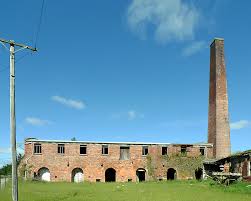The New Zealand Society of Potters reported that there are more potters per head of population in NZ than in any other country. At the peak of its popularity in the 60s and 70s, almost everyone in NZ seemed to be a potter, or if they weren’t, they claimed to know one. (I did!!)
Operating from the 1880s until 1990, the operation at Benhar was one of New Zealand’s earliest and most important commercial potteries. Unique in New Zealand, the once thriving industrial village of Benhar was a company town for the pottery works. Located 82km (51miles) south of Dunedin in South Otago, the village still consists of around 40 houses with the remains of the pottery kilns dominating the skyline. The double storied Hoffman Kiln with its 30 metre (98 feet) chimney is said to be the most complete example of its type remaining in the world.
EARLY DEVELOPMENT
Industrialist John Nelson established a coal mine at Benhar in 1864. After 12 years mining coal he branched into the pottery business because the clay in the area was suitable for this purpose. He began by manufacturing pipes and in 1890 he expanded production into bricks, tiles and garden vases.
Born in Scotland, Peter McSkimming came to New Zealand in the 1860s and tried a stint at gold prospecting at the Central Otago goldfields. Quickly realizing searching for gold was not going to make him rich, he found work in a coal mine. Again, this wasn’t going to make him wealthy. Peter eventually ended up working for 10 years at John Nelson’s pipe factory in Benhar with his son. With new immigrants arriving every week, he saw potential in supplying them with toilet bowls, wash basins, kitchen vessels and even china ornaments which at the time, had to all be imported from England. Obtaining a loan Peter and his son, also called Peter, leased the business from John, then in 1894, he purchased the pottery factory outright and straight away, he imported a Hoffman kiln. He then went about developing the Benhar pottery village including building a number of near identical brick houses for his workers to live in. He became a sort of feudal lord in the village. He banned smoking and drinking and made church service on Sundays compulsory for all able-bodied people in the village. However, he did take fatherly care of his workers by providing them with leisure outlets including a bowling green and tennis courts and he always gave presents to all his workers on their birthdays. He opened 2 shops in the village as well as a school. He also made sure the houses were warm and well provisioned. A 32 room hostel for single men was well maintained with warm bedding and comfortable furniture. Many of the workers were Dutch immigrants and Benhar was often referred to as “Little Amsterdam”.
FURTHER DEVELOPMENTS
Demand for his products increased so in 1894 Peter imported a new kiln from England. The tall chimney that remains a landmark today, was never used after the extremely religious man discovered the kiln had to be continuously fired up. This included maintaining the fire on Sundays. Being a staunch Presbyterian, he wouldn’t allow any work on Sunday so the expensive new Kiln with its imposing chimney, was never used. The building subsequently became a boiler house and the smaller, original kiln continued to do all the work.
The business continued to prosper. In 1917, he changed the business name to P. McSkimming and Son (later to be known as McSkimming Industries) At about this time, Peter introduced sanitary wares to the production line and by 1920 an expanded range of domestic products was added. McSkimming Industries became the largest ceramics manufacturer in New Zealand and production methods kept up with the times. Peter senior died in 1923 so his son, took over the business. Like his father, he was an astute businessman and was chairman on the boards of a number of the major companies of the day. He was also MP for Clutha. By1924 McSkimming Industries had two pipe making machines in operation. In another building a small team of craftsmen hand-made bespoke items. Even the brick factory could make special orders, including acid bricks for a sulphuric acid manufacturer in Auckland. By this time, the Benhar factory had become New Zealand’s leading manufacturer of earthenware pipes, sanitary ware and glazed bricks.
DEMOLITION PROTEST
McSkimming Industries was sold to Ceramco Ltd in 1980, then 9 years later to James Hardie Building Products (NZ) Ltd. On 18 February 1990, a fire swept through the complex. Only the office building, storeroom and Hoffman kiln survived the flames. After the disastrous fire, the pottery factory at Benhar ceased operation with the work being transferred to Auckland. The damaged complex was purchased by a Balclutha developer, who in 1992 proceeded to demolish the kiln so he could sell the bricks. He did not get too far before residents in neighbouring houses raced out and formed a human chain around the building. The police arrived to end the standoff. Local council later fined the man $56,500 for not getting consent, and the New Zealand Heritage Trust, appreciating the unique history of the factory complex, slapped a preservation order on the building and the developer was forced to repair the damage he had done.
In 2005, Wanganui potter Ross Mitchell-Anyon bought the historic property, including the kiln, office building and storage sheds, for an undisclosed sum. His plan was to revamp the Hoffman kiln, creating a residence for ceramic artists and other craftspeople. Unfortunately, his dream was never realized.
A couple of Dunedin artists bought the decaying complex in December 2013, moving into the surviving office building as their accommodation. They had planned to restore the main pottery building but the task at hand is huge. I was not able to find out the current status of the historic Benhar pottery works. Let’s hope Peter McSkimming’s feudal village and his never used Hoffman kiln is preserved by someone, after all, it is unique in New Zealand and well worth protecting.
Ceidrik Heward
Ceidrik Heward is an Amazon TOP SELLING AUTHOR and has lived and worked in 7 countries working as a TV cameraman, director and film tutor. For the past 17 years he has focused on writing and has been published in magazines and newspapers in Europe, USA, Asia and the Middle East.
His interests include photography, psychology and metaphysics. He loves to read and always has at least 3 books on the go. He has written 22 manuals/books and has just completed his 4th short novel. Ceidrik believes sharing information and stories is the best way to stimulate the imagination and enrich our lives.





















 Visit Today : 315
Visit Today : 315 Total Visit : 1133492
Total Visit : 1133492
Speak Your Mind